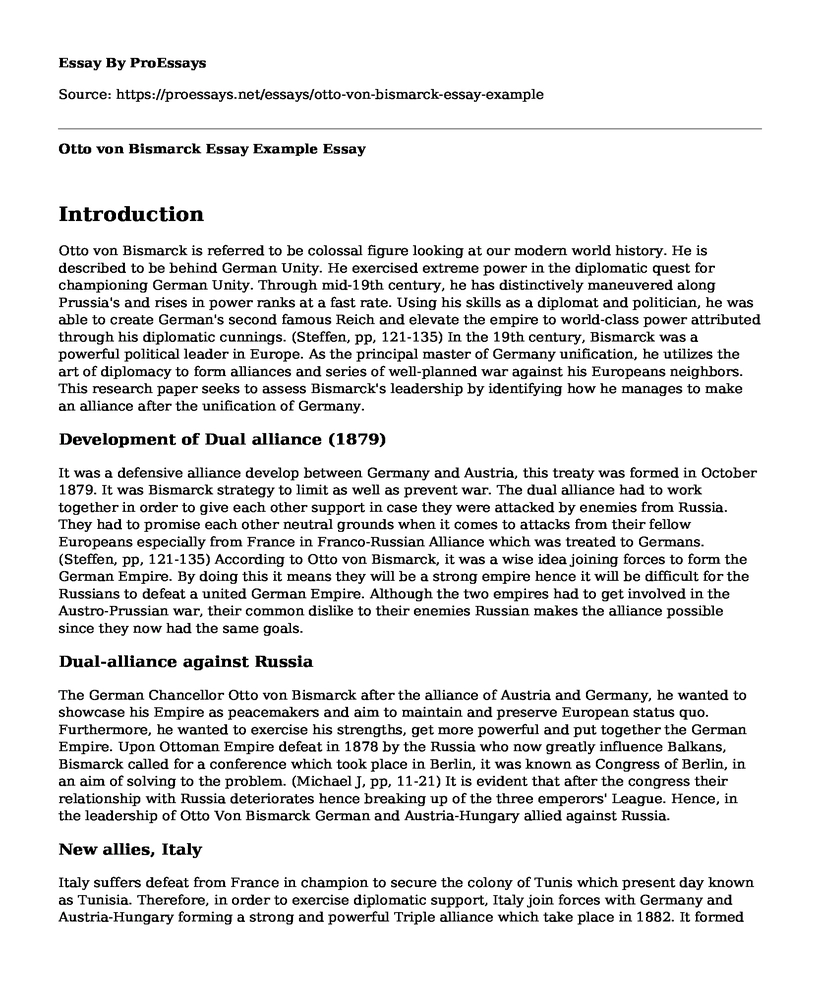Introduction
Otto von Bismarck is referred to be colossal figure looking at our modern world history. He is described to be behind German Unity. He exercised extreme power in the diplomatic quest for championing German Unity. Through mid-19th century, he has distinctively maneuvered along Prussia's and rises in power ranks at a fast rate. Using his skills as a diplomat and politician, he was able to create German's second famous Reich and elevate the empire to world-class power attributed through his diplomatic cunnings. (Steffen, pp, 121-135) In the 19th century, Bismarck was a powerful political leader in Europe. As the principal master of Germany unification, he utilizes the art of diplomacy to form alliances and series of well-planned war against his Europeans neighbors. This research paper seeks to assess Bismarck's leadership by identifying how he manages to make an alliance after the unification of Germany.
Development of Dual alliance (1879)
It was a defensive alliance develop between Germany and Austria, this treaty was formed in October 1879. It was Bismarck strategy to limit as well as prevent war. The dual alliance had to work together in order to give each other support in case they were attacked by enemies from Russia. They had to promise each other neutral grounds when it comes to attacks from their fellow Europeans especially from France in Franco-Russian Alliance which was treated to Germans. (Steffen, pp, 121-135) According to Otto von Bismarck, it was a wise idea joining forces to form the German Empire. By doing this it means they will be a strong empire hence it will be difficult for the Russians to defeat a united German Empire. Although the two empires had to get involved in the Austro-Prussian war, their common dislike to their enemies Russian makes the alliance possible since they now had the same goals.
Dual-alliance against Russia
The German Chancellor Otto von Bismarck after the alliance of Austria and Germany, he wanted to showcase his Empire as peacemakers and aim to maintain and preserve European status quo. Furthermore, he wanted to exercise his strengths, get more powerful and put together the German Empire. Upon Ottoman Empire defeat in 1878 by the Russia who now greatly influence Balkans, Bismarck called for a conference which took place in Berlin, it was known as Congress of Berlin, in an aim of solving to the problem. (Michael J, pp, 11-21) It is evident that after the congress their relationship with Russia deteriorates hence breaking up of the three emperors' League. Hence, in the leadership of Otto Von Bismarck German and Austria-Hungary allied against Russia.
New allies, Italy
Italy suffers defeat from France in champion to secure the colony of Tunis which present day known as Tunisia. Therefore, in order to exercise diplomatic support, Italy join forces with Germany and Austria-Hungary forming a strong and powerful Triple alliance which take place in 1882. It formed part of the initial conventional war-camp that took place in Europe, the second was formed in 1907 and was called Triple Entente. (Constance L, pp, 27-32) With this kind of Alliance, Otto von Bismarck formed a very powerful German Empire. However, in the world war I, Italy choose to stay neutral they did not participate in the war. Though later they declare war against Austria-Hungary and much later on against the Germans. The Dual alliance stays foot together throughout the war in a central power until they were defeated in 1918.
Conclusion
Nevertheless, Otto von Bismarck played an important role of German Unification and went ahead to develop alliances with their compatriots to develop a powerful German Empire which can defend itself from their enemies.
Works cited
Benson, Constance L. " Blood and Iron": The Military-Industrial Complex." God and Caesar. Routledge, 2018. 27-32.
Bamann, Steffen, et al. "The Demographic Change in Germany: Implications for the Pension Scheme." Globalization and Public Policy. Springer, Cham, 2015. 121-135.
Lyons, Michael J. "World War I: The Great Turning Point." World War II. Routledge, 2016. 11-21.
Cite this page
Otto von Bismarck Essay Example. (2022, Sep 22). Retrieved from https://proessays.net/essays/otto-von-bismarck-essay-example
If you are the original author of this essay and no longer wish to have it published on the ProEssays website, please click below to request its removal:
- Why Renaissance Began in Florence? - Essay Sample
- Western Civilization Transformation Paper Example
- Essay Sample on The US Revolution: Political, Economic, Social, Cultural & Moral Factors
- Dame Shirley's Letters to Sister Molly: Exploring the California Gold Rush - Essay Sample
- Essay Example on Seven Years War: A Prelude to World War?
- Paper Example on Lehman Brothers: Largest Bankruptcy in US History and Moral Problem of False Business
- Free Essay Sample on Colonial Africa







